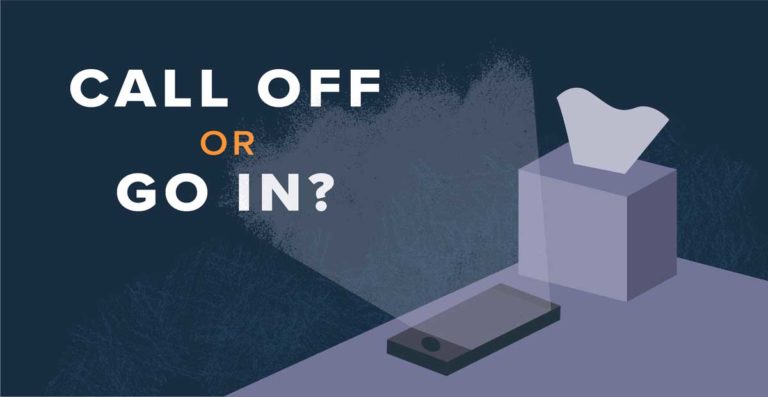Illness happens to everyone. But when you’re a nurse, calling out of work comes with a lot of unintended consequences, including forcing your coworkers to pick up the slack, inhibiting a patient’s quality of care, and making your healthcare facility less efficient. But you’re a human being, and sometimes calling out of work is your best option, especially when there’s a chance that you could infect some of your coworkers or the patients you’re trying to help. Learn how to juggle the battle between going to work when you’re sick and calling out.
The Risks of Going to Work Sick
As a nurse, you should be aware that coming to work sick means potentially infecting everyone you work with and your patients. It’s not just about your performance on the job, pleasing your supervisor, or having your pay docked. Coming to work sick puts everyone at risk. That’s why you need to think carefully before deciding to suck it up and head to work despite your illness. A small sniffle probably won’t be an issue on the floor. But if you’re hacking up a lung every time you say hello, it’s probably best if you stay home.
Penalties for Calling Out Sick
Another thing to consider when deciding if you should come to work while sick is whether your facility will penalize you for missing a shift. These might include:
- Having to make up the shift on your day off
- Having your pay docked
- Being written up
- Using your vacation time for sick leave
Most places of employment will be upfront with their employees regarding how many days they’re allowed to miss and under what circumstances. Considering the unique working conditions that go along with being a nurse, some healthcare facilities might have extremely specific sick leave policies that clearly spell out when a nurse should stay home. If you’re not sure whether you’re too sick to function on the floor, reference your employee handbook to see if there’s more information on when and how to go about calling out of work.
Tips for Drawing the Line Somewhere in Between
For many nurses, knowing when to draw the line can be a real challenge. On the one hand, you don’t want to infect your patients, but you don’t have to leave your coworkers short staffed or make a bad impression on your supervisor. So, what’s the right answer? Use these tips when deciding whether to call out.
- Call out as soon as possible, so others can try to find coverage.
- Call a doctor to get their opinion. Tell them you’re a nurse and you don’t want to infect your patients and listen to their advice.
- Research your symptoms to see if you’re contagious or not.
- Call your supervisor, describe your condition, and hear what they have to say.
- Use your sick days sparingly in case you fall gravely ill in the future.
- And, of course, take care of yourself, get plenty of sleep, eat a balanced diet, so you can stay healthy as often as possible.
Deciding to call out of work is never an easy decision when you’re a nurse. You have a lot of responsibility, so skipping a shift can come with serious implications. Be honest with yourself and your supervisor, so you can make the best decision. If you’re not too sick and your coworkers desperately need an extra hand, you should probably go in. But if you’re too ill to be efficient on the floor and your supervisor can handle your patient load without you, stay home.
